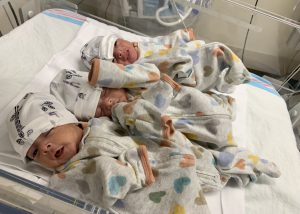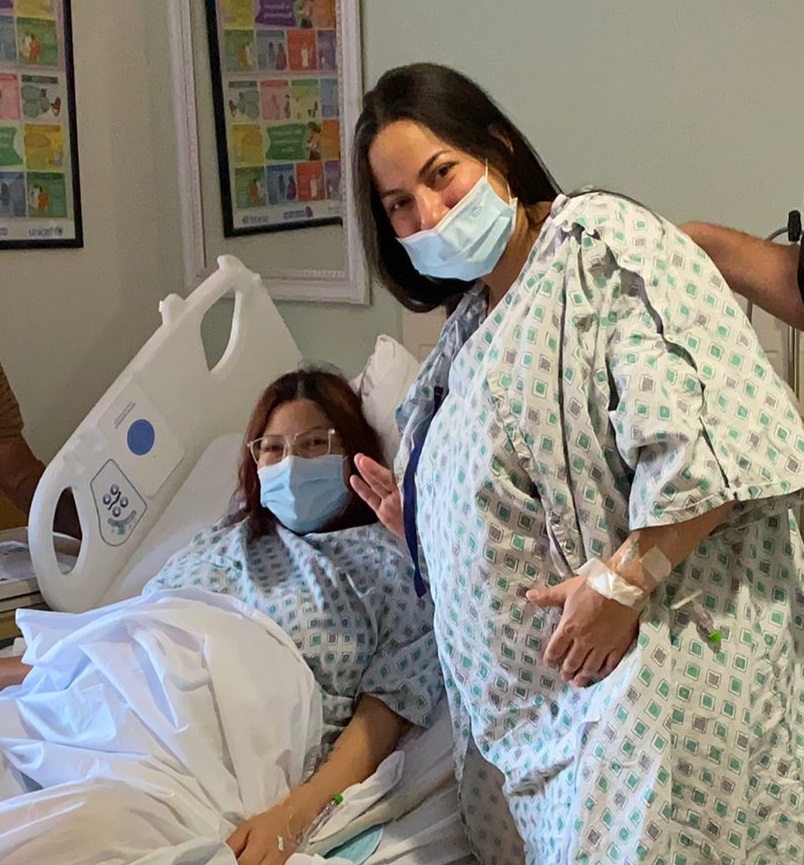 According to statistics reported by the Centers for Disease Control and Prevention (CDC) in March 2021, over 3 million babies were born in the United States in 2019. Among this group, only 3,136 were triplets.
According to statistics reported by the Centers for Disease Control and Prevention (CDC) in March 2021, over 3 million babies were born in the United States in 2019. Among this group, only 3,136 were triplets.
Very few of these births occurred spontaneously (without the assistance of fertility treatments). This is because the chance of triplets being conceived naturally occurs in 1 in every 10,000 pregnancies.
Spontaneous triplets are uncommon, and with birth rates declining across the country, Jamaica Hospital Medical Center was not anticipating that it would be setting a record for the facility by delivering two sets of triplets, both naturally conceived, two days apart. “The chance of this happening is rare. So, when we learned that two of our moms were expected to deliver triplets very close to each other, we were excited. We also knew there would be a lot of hard work and careful planning ahead,” said Dr. Janice Krystal Ascencio, Women’s Health ACC Medical Director.
Having triplets or any form of multiple pregnancy is considered high risk. There are often health problems that can develop and lead to preterm labor and birth. Therefore, it was important for the babies’ healthcare team at Jamaica Hospital to begin specialized care early in the mothers’ pregnancies.
“We encountered a few complications during both pregnancies, shared Dr. Ugochi Akoma, Maternal Fetal Medicine Specialist and Director of Perinatal Diagnostic Centers & Obstetric Ultrasound at Jamaica Hospital. “Both moms at some point in the early third trimester had to be monitored closely for concerning cardiac symptoms. Moms who are pregnant with multifetal pregnancies have a higher risk of developing a cardiac condition called peripartum cardiomyopathy which fortunately was not diagnosed.”
There were also concerns about the babies’ health. Doctors diagnosed one of the triplets with fetal growth restriction, a condition that causes babies not to grow and develop according to gestational age standards. In the other set of triplets, two of the babies shared one placenta. There are several problems that could occur when this happens, the most significant is a conditon called twin-twin transfusion syndrome (TTTS).
Caring for the moms and babies was a well-coordinated effort between multiple departments. There were frequent meetings and mock drills conducted that involved OB/GYN, NICU, Nursing, Pediatric, Cardiology, Respiratory, BioMed, Anesthesia, Medicine, Social Work and Blood Bank professionals. “We worked together as one team and our collective goal was to ensure a safe pregnancy and delivery for both families,” said Dr. Akoma.
At the center of this healthcare team were the moms. Making sure that their voices were heard, and that they felt empowered throughout their journeys was made a high priority. Jamaica Hospital provided a supportive environment in which strong bonds were formed between the patients and their healthcare providers. The moms also developed a relationship with each other, becoming close friends.
Months of preparation and planning resulted in two successful deliveries. On November 9, 2021, the Cruz family welcomed their baby girls into the world. The Hoyos family celebrated the birth of their little girls two days later. Both sets of triplets were born during the 32nd week of the pregnancy. After delivery, the babies were transferred to the hospital’s Level 3 NICU where they received around-the-clock care.
Six little miracles made their debut at Jamaica Hospital in time for the holiday season, giving all involved in this journey a reason to be thankful. “Our team is humbled to have had the privilege of caring for and delivering these babies. There was lots of hard work but there was just as much joy,” stated Dr. Akoma.



